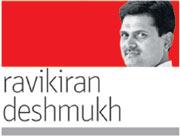Imagine a scene in which an election observer is holding a meeting of traders’ bodies from a constituency, asking them to report large-scale purchases of gifts or particular items to him, as those could be used to lure voters


Imagine a scene in which an election observer is holding a meeting of traders’ bodies from a constituency, asking them to report large-scale purchases of gifts or particular items to him, as those could be used to lure voters. Such a scene was rare in the past; it’s common during the ongoing programme of general elections.
General elections have been a periodic affair and its features were almost the same, until a person named T N Seshan took over as Chief Election Commissioner of India in the ‘90s. He not only proved as a game changer, but also set things in order. For this he did not do anything special, nor did he ask for special laws; he used each and every provision of The Representation of People Act to involve common voters in the election process.
Prior to that, elections were something of a festival of the privileged class who used to mock the system. Words such as booth capturing, setting polling booths on fire, burning ballot papers, threatening people at gunpoint to not to vote or vote in favour of someone, were common. A few generations of voters did not even vote personally; someone else would do it for them.
Slowly, but steadily, Indian democracy is showing signs of maturity, at least in holding free and fair elections. Elections these days are being held under strict observation of the Election Commission, and the bureaucracy follows its orders with utmost obedience. Even political parties and their leaders do not dare flout any of the norms specified under the model code of conduct.
The upcoming elections are going to be unique — there are four observers deputed for each parliamentary constituency, who have been taking extra efforts to ensure free and fair elections to the maximum extent possible.
The four observers are — a general observer, an expenditure observer, a police observer in particular constituencies, and a general awareness observer.
While the general and expenditure observers have been there since the ‘90s, the decision to appoint a police observer was taken in view of complaints over law and order, especially at sensitive booths in troubled and Naxal-hit areas. The general awareness observer is a new concept being implemented to create awareness aboutvoting. These observers are holding innovative programmes and workshops in cities and villages to ensure their maximum participation in voting.
Apart from that, the most noticeable feature of this election is of controlling expenditure. Officers, mostly from the Indian Revenue Service, are keeping a vigil on poll expenses and accounts. Probably for the first time, huge cash hauls have been detected and the amounts have gone beyond R10 crore approximately. Instances of special nakabandis on major roads, special squads at railway stations, bus stations to check transportation of cash meant for distribution among voters were rare or unheard.
Similarly, election authorities are keeping a close watch on bank transactions of big amounts and select accounts.
Even huge purchases in markets are being observed. Traders are being asked to cooperate or face the music for hiding any type of suspicious purchase of household items in bulk. Special toll-free numbers have been circulated to report any suspicious movements and transactions, to prevent any type of allurements to voters. The state excise department has been asked to submit reports on manufacture and sale of liquor beyond 50 per cent of the normal consumption and demand.
Above all, the important thing is that all this is not being done under any new law or special set of rules. All provisions are present in the existing laws. For instance, there is a law to prevent misuse of public places, roads to put up banners and hoardings. But, barring election time, most places are defaced with ugly hoardings, banners and posters.
Also, there are rules on how cash-related transactions should be made. Authorities have powers to check and verify sources of funds, if they come across amounts beyond R20,000 during searches. But, such rules remain in the books during the rest of the period. It also proves that authorities work under pressure, or are unwilling to work according to powers vested with them.
The writer is Political Editor of mid-day
 Subscribe today by clicking the link and stay updated with the latest news!" Click here!
Subscribe today by clicking the link and stay updated with the latest news!" Click here!









